In today's #vatniksoup, I'll talk about TikTok (@tiktok_us), why some of the US legislators want to ban it, what are the app's connections to the Chinese Communist Party, and how the app has changed the social media landscape, especially among young people.
1/23
1/23

Tiktok's potential reach and potential political impact is actually huge, which is why US politicians are currently having such a heated debate over it right now. First of all, TikTok has over 1 billion monthly active users & it's been downloaded more than 4.1 billion times.
2/23
2/23

The app tends to appeal to younger users - 41% of the app's users are aged between 16 and 24. By Jul 2023, TikTok had become the primary news source for British teens and in Finland, around half of 13-18 year-olds get their news from TikTok.
3/23


3/23


Chinese citizens also have their "own version" of TikTok called Douyin. The Chinese version offers a child-friendly version that shows its users science experiments, museum exhibits, CCP propaganda and educational videos. It also limits the use time to 40 minutes per day.
4/23
4/23

TikTok has also been accused of censorship. The app's policies ban content related to a specific list of foreign leaders, including Vladimir Putin and Turkish president Recep Tayyip Erdogan. Its moderators were also told to suppress content from creators who were "too ugly".
5/23


5/23

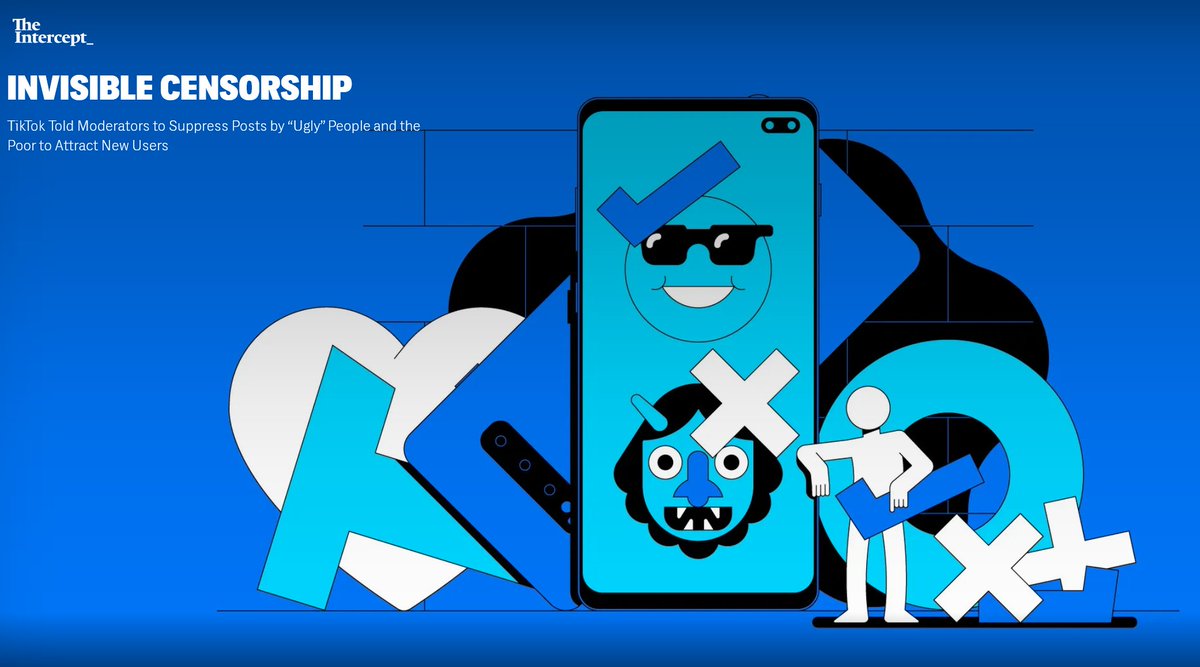
A 2023 study by Rutgers University said that there's a "strong possibility that content on TikTok is either amplified or suppressed based on its alignment with the interests of the Chinese government." TikTok later removed the ability to analyze hashtags of sensitive topics.
6/23
6/23

Many conspiracy theories, including Pizzagate and QAnon, are extremely popular on the platform. In Dec 2023, @O_Rob1nson and @Shayan86 BBC reported that they had discovered nearly 800 fake accounts on Tiktok promoting Russian propaganda and disinformation.
7/23



7/23



In 2021, the app received praise from Kremlin officials for removing content related to protests in Russia. Russia's censorship agency Roskomnadzor thanked TikTok because they "actively cooperated with us, which cannot be said about others."
8/23
8/23

TikTok is also one of the few social media platforms still available in Russia, because TikTok has caved to the Russian government's influence and banned content from foreign creators. Most Russian TikTok creators spread pro-invasion and pro-Kremlin views.
9/23


9/23


Recently, in the US, a bill that could lead to TikTok being banned in the US received unanimous bipartisan support (50-0). The bill would require the Beijing-based owner of the app, ByteDance, to give up their shares of the app to avoid the ban & put it under new ownership.
10/23
10/23

ByteDance replied by showing their US-based users a pop-up message, urging people to call their representatives and tell them to vote "No" on the legislation. The company also claimed that it's a violation against their First Amendment rights.
11/23



11/23



TikTok's former head of engineering in the US revealed in Jun 2023, that some CCP members had "super user" access to TikTok data, and that they used this access to spy on Hong Kong protesters and civil rights activists by monitoring their locations and devices.
12/23


12/23


TikTok's parent company ByteDance's employees in the US and China also accessed the app's user data in an attempt to track down Buzzfeed News and Financial Times journalists who exposed information about the company's eavesdropping activities.
13/23



13/23



The current controversy is not the first one that TikTok is facing - in 2020, Donald Trump sought to ban TikTok but was eventually blocked by the courts. Recently he backtracked, saying that banning TikTok would help Facebook and "double their business".
14/23




14/23
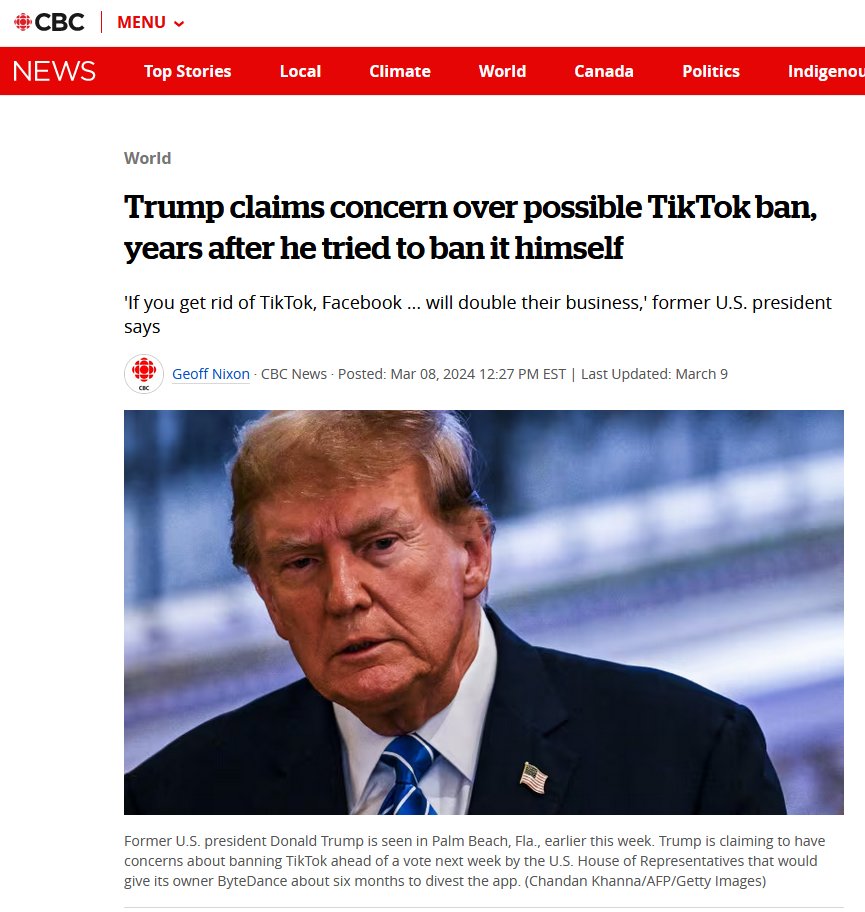

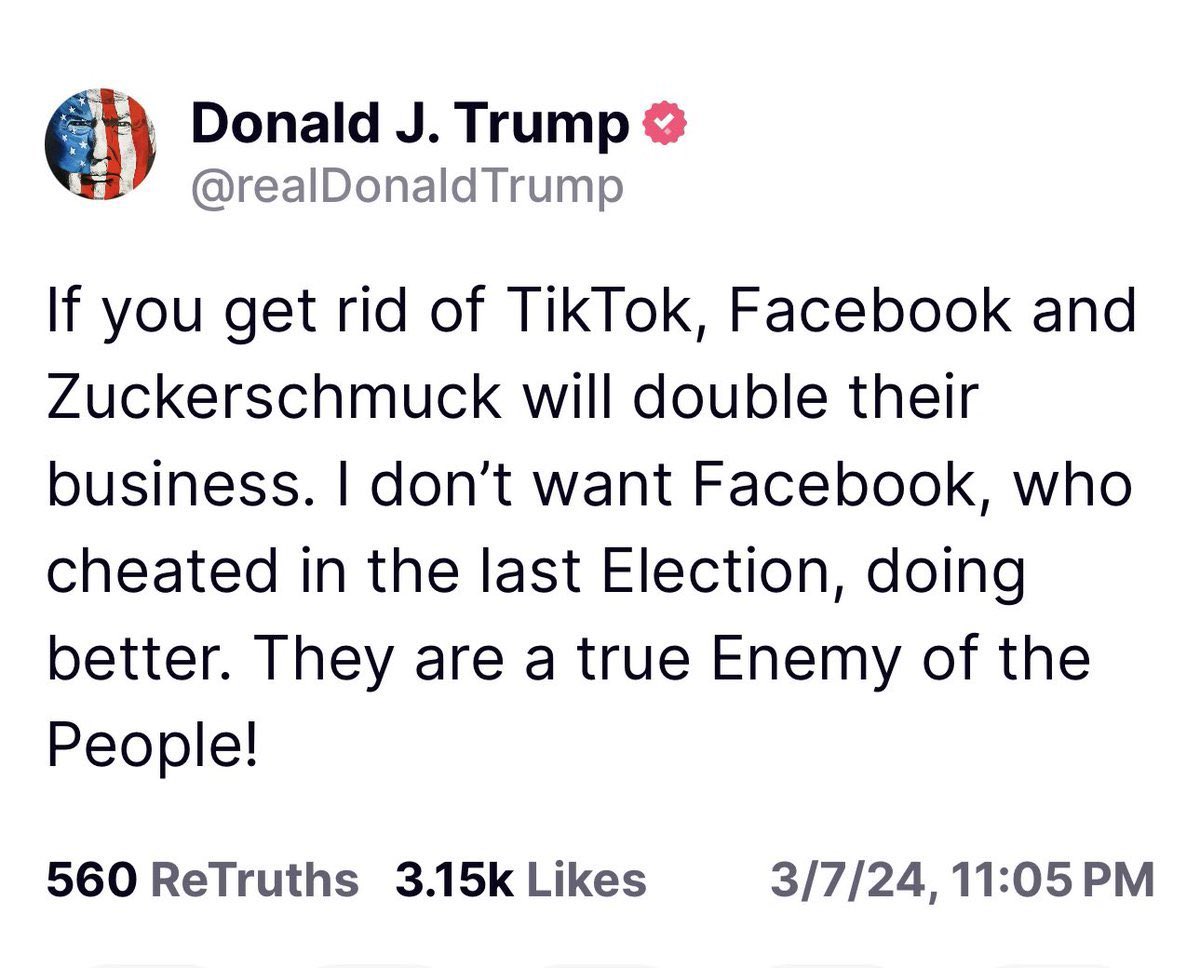

Why are some countries trying to ban TikTok? First of all, TikTok is owned by a Chinese company called ByteDance. According to National Intelligence Law of the People's Republic of China,the CCP can demand ByteDance to give up any data for intelligence-gathering operations.
15/23


15/23


TikTok also collects vast amounts of data from its users, thus creating a "digital fingerprint" of social behavior, trends and opinions of its +1 billion active users. This data can then be used to persuade the masses and predict future trends relatively accurately.
16/23
16/23

The app is especially popular among children and teenagers, a target group much more vulnerable to manipulation and addictive use. In the Western version of the app, TikTok's safeguards in protecting children are generally considered to be insufficient.
17/23




17/23


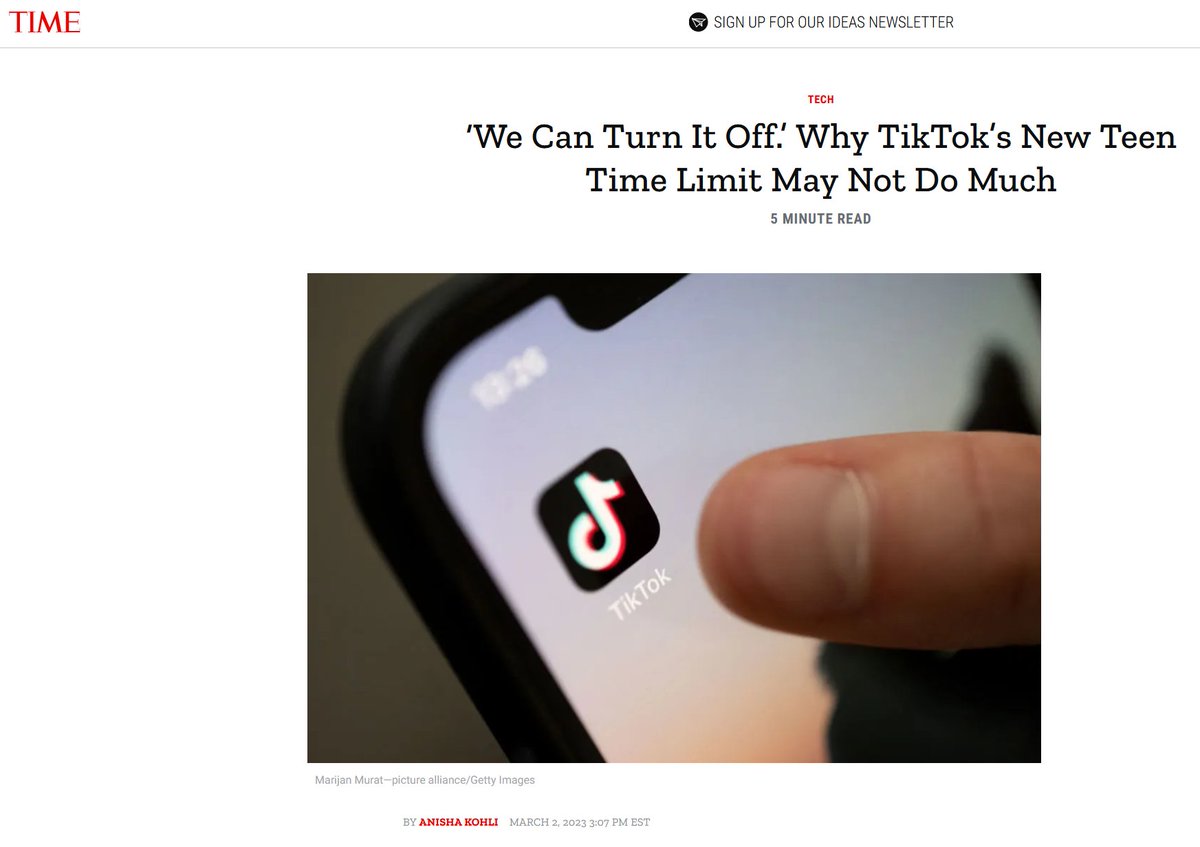

Due to this, the EU Commission opened an investigation into TikTok over "suspected breach of transparency and obligations to protect minors". According to the Commission, there were big problems with TikTok's addictive design, rabbit hole effect and age verification.
18/23
18/23

There's no doubt that TikTok could play an important role in the upcoming 2024 US presidential election. Because of this, the potential ban has probably been opposed by Trump and his henchmen like @VivekGRamaswamy and @KellyannePolls.
19/23




19/23




TikTok's popularity has also annoyed Facebook's parent company Meta. They hired one of the biggest Republican consulting firms, Targeted Victory, to undermine TikTok and present it as a "danger to American children and society" & as the "most harmful social media platform".
20/23


20/23

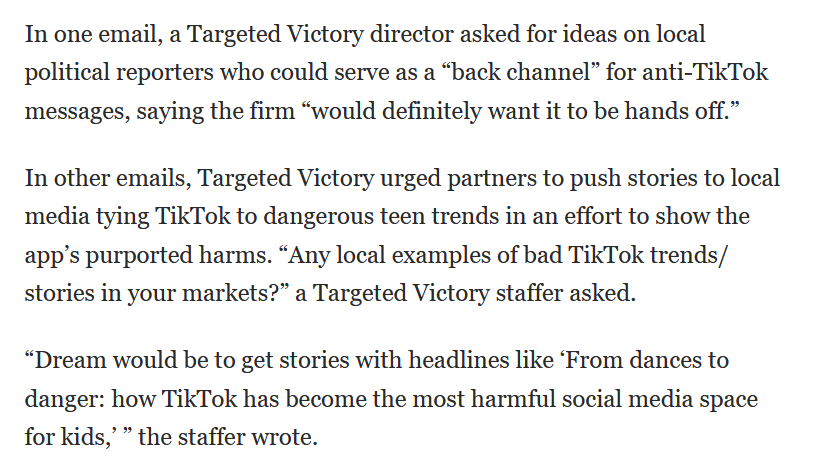
In my view, the dangers of TikTok stem from three issues: 1) ByteDance not being transparent about the app's connections to the CCP (and them lying about it previously), 2) the aggressive collection of massive amounts of data, and 3) the lack of safeguards for young users.
21/23


21/23


As long as TikTok ownership is somehow related to the CCP, there is a chance that the National Intelligence Law is being invoked, and Chinese officials potentially have full access to the data TikTok collects from its users and creators, making it a huge security risk.
22/23
22/23

Most of the creator data,including tax forms, social security numbers & other information from creators & outside vendors are actually stored in datacenters in China. But I guess giving up your personal information is the price you have to pay in order to be paid by TikTok.
23/23
23/23
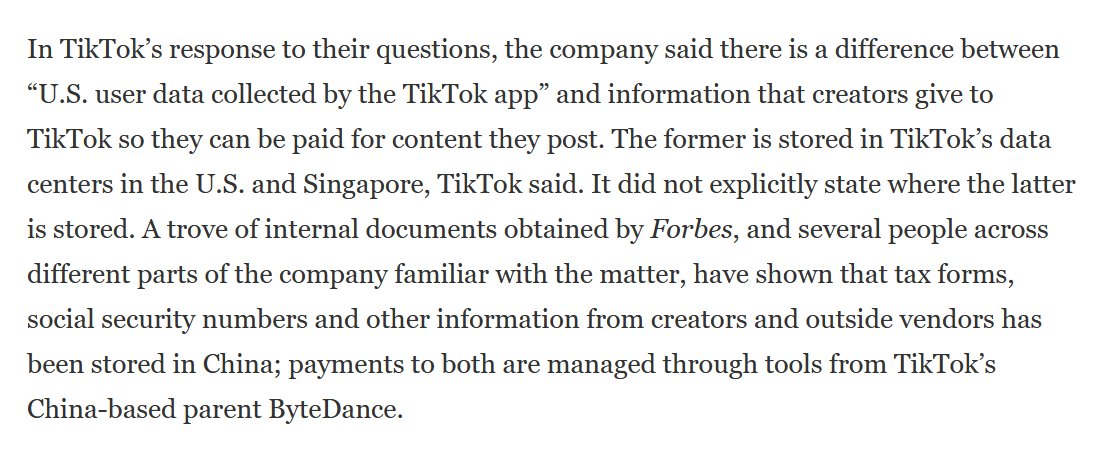
• • •
Missing some Tweet in this thread? You can try to
force a refresh


































